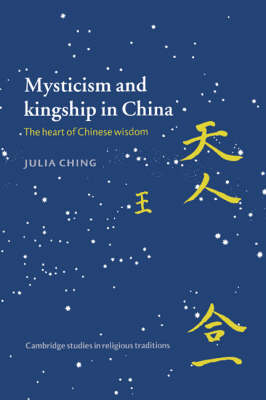
Mysticism and Kingship in China
The Heart of Chinese Wisdom
Seiten
1997
Cambridge University Press (Verlag)
978-0-521-46828-2 (ISBN)
Cambridge University Press (Verlag)
978-0-521-46828-2 (ISBN)
In this book, Julia Ching offers a magisterial survey of over four thousand years of Chinese civilisation through an examination of the relationship between kingship and mysticism. Lucidly written, the book will be of interest to anyone seeking to understand how today's China continues to draw on its past.
In this book, Julia Ching offers a magisterial survey of over four thousand years of Chinese civilisation through an examination of the relationship between kingship and mysticism. She investigates the sage-king myth and ideal, arguing that institutions of kingship were bound up with cultivation of trance states and communication with spirits. Over time, these associations were retained, though sidelined, as the sage-king myth became a model for the actual ruler, with a messianic appeal for the ruled. As a paradigm, it also became appropriated by private individuals who strove for wisdom without becoming kings. As the Confucian tradition interacted with the Taoist and the Buddhist, the religious character of spiritual and mystical cultivation became more pronounced. But the sage-king idea continued, promoting expectations of benevolent despotism rather than democratisation in Chinese civilisation.
In this book, Julia Ching offers a magisterial survey of over four thousand years of Chinese civilisation through an examination of the relationship between kingship and mysticism. She investigates the sage-king myth and ideal, arguing that institutions of kingship were bound up with cultivation of trance states and communication with spirits. Over time, these associations were retained, though sidelined, as the sage-king myth became a model for the actual ruler, with a messianic appeal for the ruled. As a paradigm, it also became appropriated by private individuals who strove for wisdom without becoming kings. As the Confucian tradition interacted with the Taoist and the Buddhist, the religious character of spiritual and mystical cultivation became more pronounced. But the sage-king idea continued, promoting expectations of benevolent despotism rather than democratisation in Chinese civilisation.
Preface; 1. Son of heaven: shamanic kingship; 2. Son of heaven: kingship as cosmic paradigm; 3. The moral teacher as sage: philosophy appropriates the paradigm; 4. The metaphysician as sage: philosophy again appropriates the paradigm; 5. The paradigm enshrined: the authority of classics; 6. The mystic as sage: religion appropriates the paradigm; 7. The sage-king as messiah: religion again appropriates the paradigm; 8. All under heaven: political power and the periphery; A Glossary of Sino-Japanese names and terms; Bibliography; Index.
| Erscheint lt. Verlag | 13.11.1997 |
|---|---|
| Reihe/Serie | Cambridge Studies in Religious Traditions |
| Zusatzinfo | 2 Line drawings, unspecified |
| Verlagsort | Cambridge |
| Sprache | englisch |
| Maße | 154 x 230 mm |
| Gewicht | 500 g |
| Themenwelt | Geisteswissenschaften ► Geschichte ► Regional- / Ländergeschichte |
| Geisteswissenschaften ► Religion / Theologie ► Buddhismus | |
| ISBN-10 | 0-521-46828-0 / 0521468280 |
| ISBN-13 | 978-0-521-46828-2 / 9780521468282 |
| Zustand | Neuware |
| Haben Sie eine Frage zum Produkt? |
Mehr entdecken
aus dem Bereich
aus dem Bereich
Erinnerungen
Buch | Softcover (2024)
Pantheon (Verlag)
CHF 22,40
Universalgelehrter, Polarreisender, Entdecker
Buch | Hardcover (2024)
mareverlag
CHF 39,20


